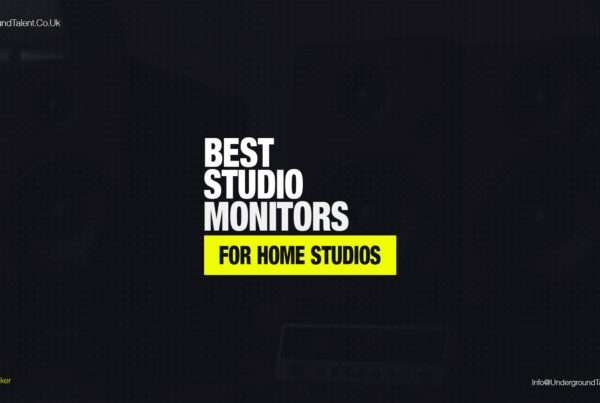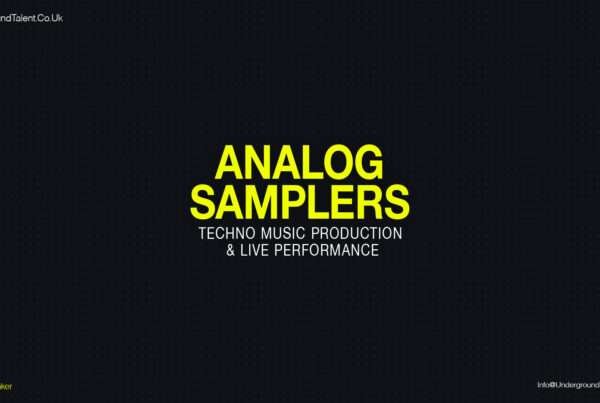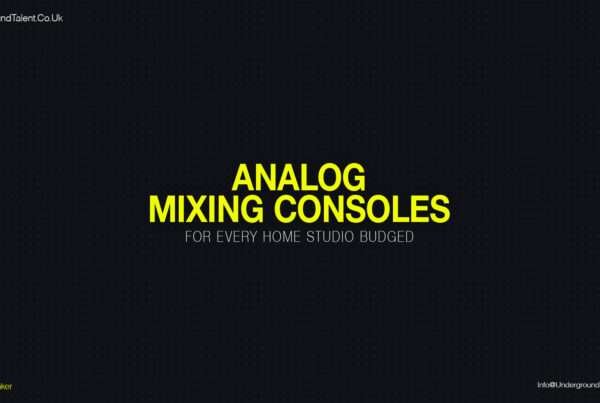Quick List of Best MIDI Keyboards for Beginners
Here’s a quick list of the best MIDI keyboards for beginners, offering a range of features to suit various needs and budgets:
- AKAI PROFESSIONAL LPK25 MK2
- NOVATION LAUNCHKEY MINI [MK3]
- SUBZERO CONTROLKEY49S 49 KEY
- AKAI Professional MPK Mini MK3
- KORG NANOKEY2
- M-AUDIO KEYSTATION 49 MKIII
- ALESIS V49 MKII
- NOVATION FLKEY 49
- M-AUDIO KEYSTATION MINI 32 MKIII
Discover the best MIDI keyboard to kickstart your music production journey by exploring our detailed guide on the best options for beginners.
Introduction to MIDI Keyboards for Beginners
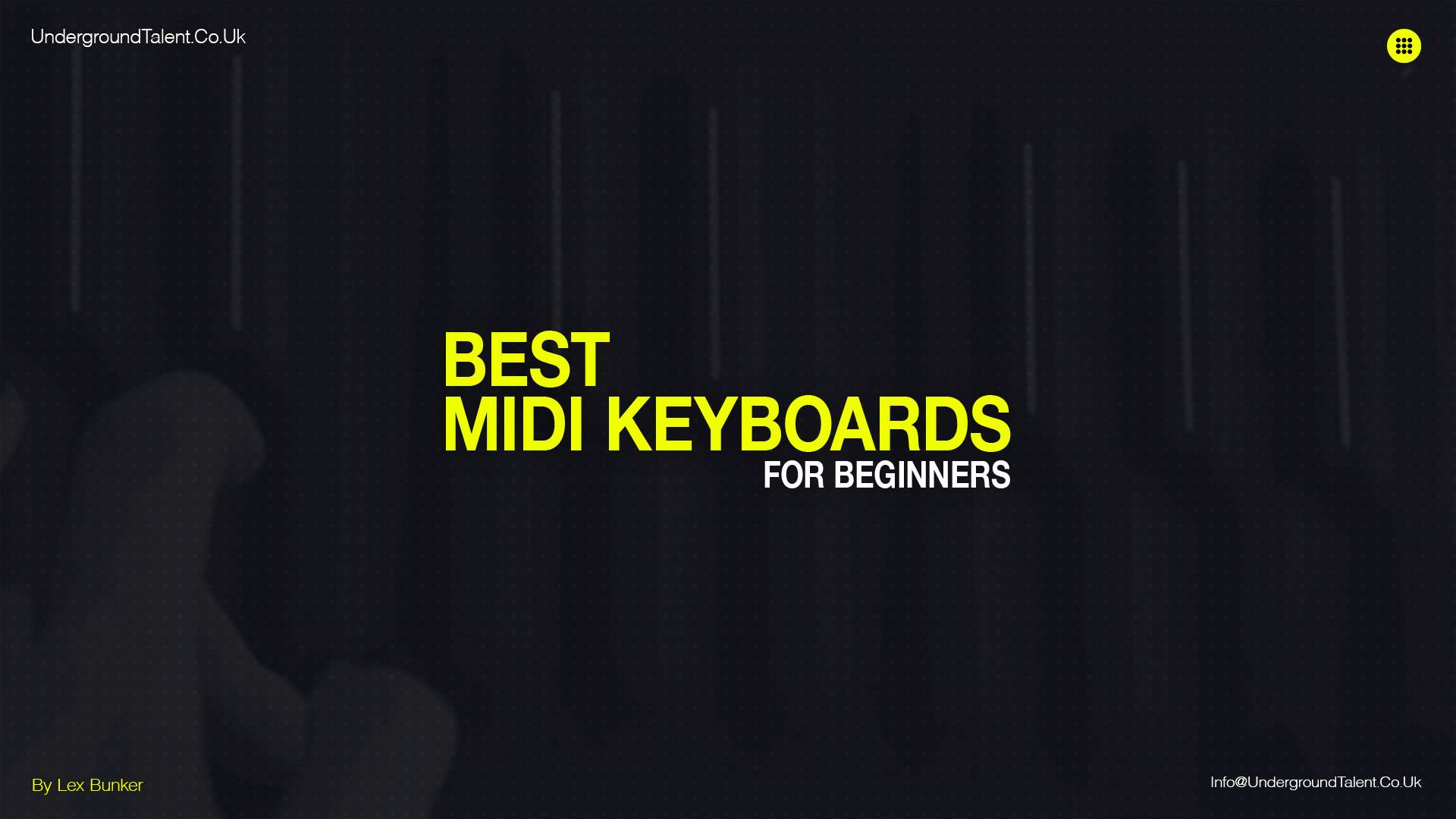
What Are MIDI Keyboards?
MIDI keyboards are electronic musical instruments that send MIDI (Musical Instrument Digital Interface) signals to other devices, such as computers or synthesizers, to control sounds and create music.
Importance of MIDI Keyboards for Beginners
MIDI keyboards are essential tools for new musicians. They make learning music production fun and accessible.
Beginners can easily explore different sounds and instruments.
These keyboards simplify the music creation process. They help users understand music theory and improve their skills quickly. With a MIDI keyboard, beginners can record and edit their music effortlessly.
Criteria for Selecting Beginner-Friendly MIDI Keyboards
Choosing the right MIDI keyboard is crucial for beginners.
Look for keyboards with user-friendly interfaces and quality build. Portability is also important for easy transport and storage. Consider the number of keys; fewer keys make learning less overwhelming. Check for compatibility with popular software. Extra features like drum pads and knobs can enhance creativity.
Finally, affordability matters; find a keyboard that offers great value without breaking the bank.
Best MIDI Keyboards for Beginners
**Disclosures: We earn a commission on purchases through our Amazon links (supports Underground Talent!), so if you see something you like, grab it below and help us keep finding cool stuff!
AKAI Professional LPK25 MK2: Ideal for Beginners

The AKAI Professional LPK25 MK2 is perfect for beginners. Its compact size makes it easy to carry anywhere. With 25 velocity-sensitive keys, it offers excellent responsiveness. This MIDI keyboard connects easily to your computer via USB, ensuring a hassle-free setup. The LPK25 MK2 includes an arpeggiator, which adds a creative spark to your music production. Its plug-and-play functionality eliminates the need for complex installations.
Despite its small size, it delivers powerful performance, making it ideal for creating music on the go. Affordable yet feature-packed, the AKAI LPK25 MK2 offers great value. It’s perfect for those just starting in music production. Whether you’re making beats or composing melodies, this keyboard delivers. Beginners will appreciate its user-friendly design and versatility. For an excellent start in music production, choose the AKAI Professional LPK25 MK2.
Pros:
- Compact and portable design
- 25 velocity-sensitive keys
- Easy USB connectivity
- Built-in arpeggiator
- Affordable price
- Plug-and-play functionality
Cons:
- Limited to 25 keys
- No drum pads or knobs
- Basic features compared to larger models
Novation Launchkey Mini [MK3]: A Must-Have for New Musicians
![Novation Launchkey Mini [MK3] — Portable 25-Key, USB, MIDI Keyboard Controller with DAW Integration. Fixed Chord Mode and Arpeggiator — for Music Production](https://undergroundtalent.co.uk/wp-content/uploads/2024/05/Novation-Launchkey-Mini-MK3-—-Portable-25-Key-USB-MIDI-Keyboard-Controller-with-DAW-Integration.-Fixed-Chord-Mode-and-Arpeggiator-—-for-Music-Production.jpg)
The Novation Launchkey Mini [MK3] is a fantastic choice for beginners. It integrates seamlessly with Ableton Live, making it ideal for new musicians. This compact MIDI keyboard features 25 velocity-sensitive keys, ensuring a responsive playing experience. The 16 RGB backlit pads are perfect for creating dynamic beats and triggering samples. With its easy-to-use controls, you can adjust pitch, modulation, and other parameters on the fly.
The Launchkey Mini [MK3] also includes a powerful software bundle, giving beginners a comprehensive toolkit for music production. Its compact design makes it easy to transport, perfect for musicians on the move. The Novation Launchkey Mini [MK3] is an excellent investment for anyone starting their music journey. It combines portability, functionality, and a user-friendly interface, making music creation intuitive and enjoyable.
Pros:
- Seamless integration with Ableton Live
- 25 velocity-sensitive keys
- 16 RGB backlit pads
- Compact and portable design
- User-friendly controls
- Includes powerful software bundle
Cons:
- Limited to 25 keys
- No full-sized keys
- Primarily designed for Ableton Live users
SUBZERO CONTROLKEY49S: Affordable and Versatile
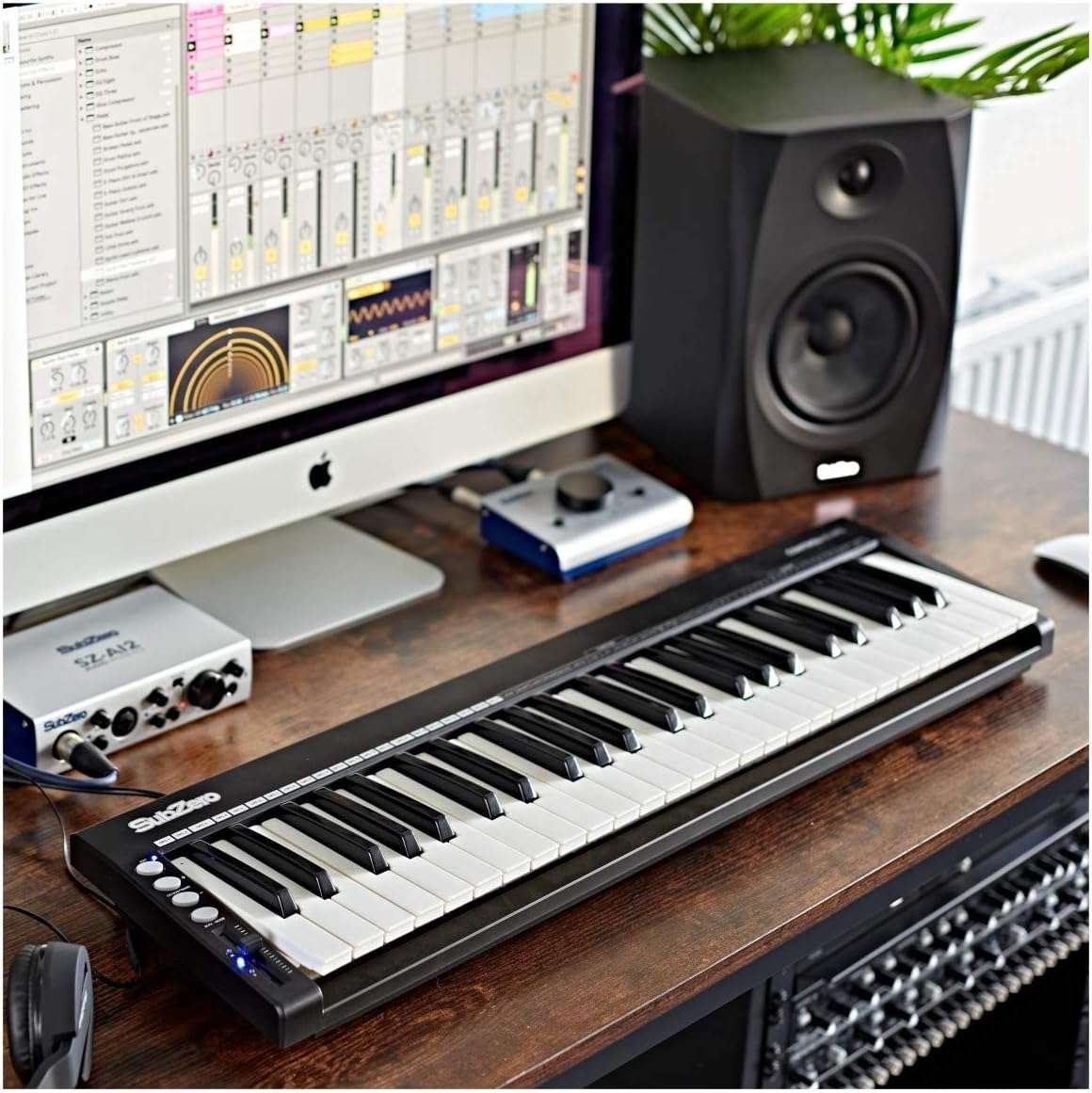
The SUBZERO CONTROLKEY49S is a fantastic MIDI keyboard for beginners looking for a full-size option. 49 keys offer a more extensive range for playing complex pieces and practising finger techniques. This keyboard provides a solid, responsive feel, making it ideal for new musicians developing their skills. It connects easily via USB, ensuring a quick and straightforward setup.
The CONTROLKEY49S is compatible with most DAWs, giving beginners flexibility in their music production. Despite its larger size, it remains affordable, making it a great value for its features. The keyboard’s simple, user-friendly design makes it accessible for those just starting. Whether you’re composing, recording, or performing, the SUBZERO CONTROLKEY49S offers a versatile and reliable solution for beginner musicians.
Pros:
- 49 full-size keys
- Solid and responsive feel
- Easy USB connectivity
- Compatible with most DAWs
- Affordable price
- User-friendly design
Cons:
- Larger and less portable
- Basic features compared to high-end models
- No drum pads or knobs
AKAI Professional MPK Mini MK3: Compact and Powerful
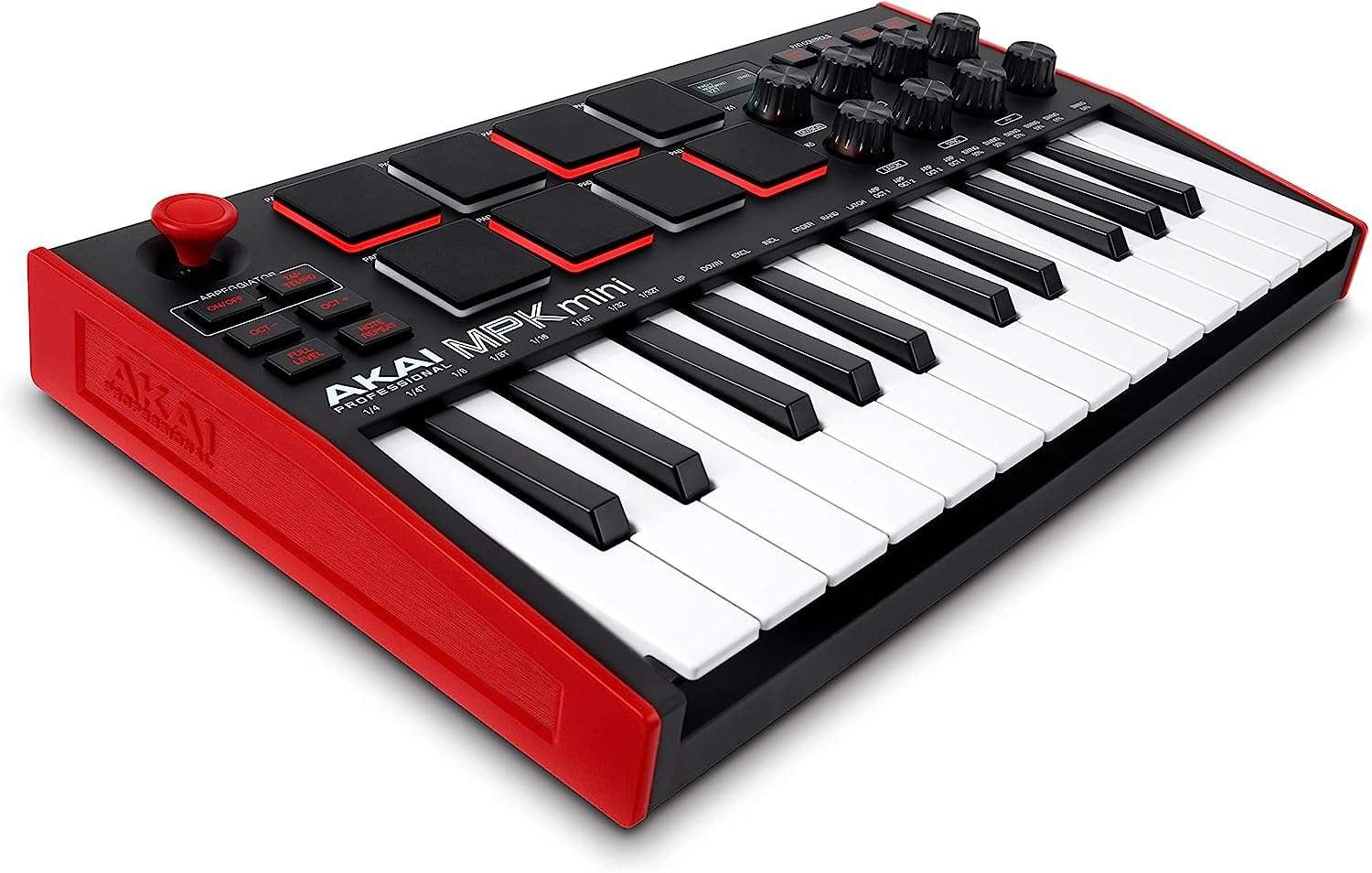
The AKAI Professional MPK Mini MK3 is a top choice for beginners seeking a versatile MIDI keyboard.
With 25 velocity-sensitive keys, it offers a responsive playing experience. This compact keyboard features eight backlit drum pads, perfect for creating beats and triggering samples. Additionally, the MPK Mini MK3 includes eight assignable knobs, allowing for precise control over your sound. Its intuitive interface and plug-and-play functionality make it easy for beginners to start creating music immediately.
The MPK Mini MK3 connects via USB, ensuring seamless integration with your computer and DAW. Despite its small size, it delivers a powerful performance, making it ideal for both studio and mobile use. The included software bundle provides a comprehensive toolkit for new musicians.
The AKAI Professional MPK Mini MK3 is an excellent choice for those starting their music production journey.
Pros:
- 25 velocity-sensitive keys
- Eight backlit drum pads
- Eight assignable knobs
- Compact and portable design
- Easy USB connectivity
- Intuitive interface and plug-and-play functionality
- Includes a comprehensive software bundle
Cons:
- Limited to 25 keys
- Smaller sizes may not suit all playing styles
- Pads and knobs may be overwhelming for absolute beginners
KORG NANOKEY2 USB MIDI Controller: Ultra-Slim and User-Friendly

The KORG NANOKEY2 USB MIDI Controller is an excellent choice for beginners seeking a compact and straightforward keyboard.
Its ultra-slim design makes it highly portable, perfect for musicians on the go. The NANOKEY2 features 25 velocity-sensitive keys, providing a responsive and dynamic playing experience. This MIDI controller connects easily via USB, ensuring a quick and hassle-free setup.
Despite its minimalist design, it offers useful features like octave shift buttons and sustains functionality, enhancing your music creation process. The NANOKEY2 is compatible with most DAWs, allowing beginners to explore various music production software. Its simplicity and ease of use make it an ideal starting point for new musicians.
If you’re looking for a portable and affordable MIDI controller, the KORG NANOKEY2 is a fantastic option.
Pros:
- Ultra-slim and portable design
- 25 velocity-sensitive keys
- Easy USB connectivity
- Octave shift buttons and sustain functionality
- Compatible with most DAWs
- Affordable price
Cons:
- Limited to 25 keys
- No drum pads or knobs
- Basic features compared to larger controllers
M-AUDIO Keystation 49 MK3: Full-Size and Beginner-Friendly
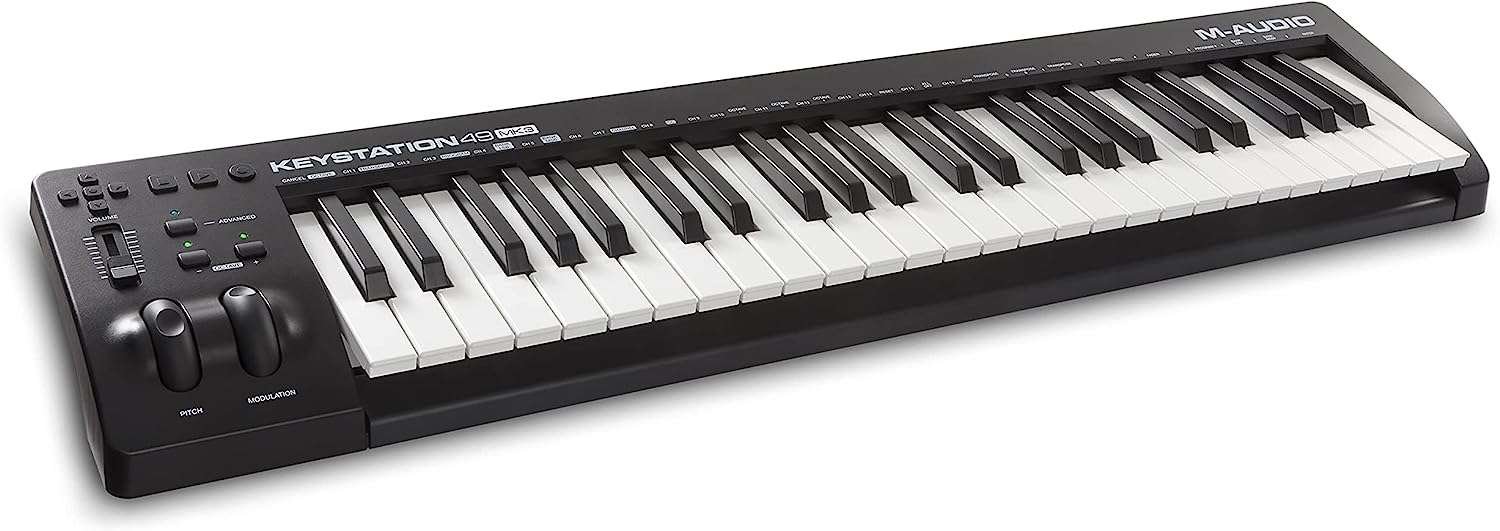
The M-AUDIO Keystation 49 MK3 is an excellent MIDI keyboard for beginners who need a full-size option. With 49 full-size, velocity-sensitive keys, it offers a realistic playing experience, ideal for learning and practising. The Keystation 49 MK3 connects easily via USB, providing a hassle-free setup. Its simple and intuitive design makes it user-friendly, and perfect for new musicians. This MIDI keyboard is compatible with most DAWs, giving beginners flexibility in their music production. Despite its larger size, it remains lightweight and portable, making it suitable for home studios and mobile use. The Keystation 49 MK3 includes a comprehensive software bundle, providing beginners with all the tools needed to start creating music. For a versatile and reliable keyboard, the M-AUDIO Keystation 49 MKIII is a top choice.
Pros:
- 49 full-size velocity-sensitive keys
- Easy USB connectivity
- Simple and intuitive design
- Compatible with most DAWs
- Lightweight and portable
- Includes a comprehensive software bundle
Cons:
- Larger size compared to compact models
- No drum pads or knobs
- Basic features compared to advanced controllers
ALESIS V49 MKII: Expressive and Feature-Rich

The ALESIS V49 MKII is a fantastic MIDI keyboard for beginners seeking a feature-rich and expressive instrument.
With 49 full-size, velocity-sensitive keys, it provides an authentic playing experience. This keyboard includes eight backlit drum pads, perfect for creating beats and triggering samples.
Additionally, the V49 MKII features four assignable knobs and buttons, allowing for precise control over your sound. Its intuitive interface and plug-and-play functionality make it easy for beginners to start making music right away. The V49 MKII connects via USB, ensuring seamless integration with your computer and DAW.
Despite its larger size, it remains lightweight and portable, suitable for both studio and mobile use. For beginners looking for a versatile and expressive MIDI keyboard, the ALESIS V49 MKII is an excellent option.
Pros:
- 49 full-size velocity-sensitive keys
- Eight backlit drum pads
- Four assignable knobs and buttons
- Easy USB connectivity
- Intuitive interface and plug-and-play functionality
- Lightweight and portable
Cons:
- Larger size compared to compact models
- Pads and knobs may be overwhelming for absolute beginners
- Requires some learning curve to utilize all features
Novation FLKEY 49: Perfect for FL Studio Users
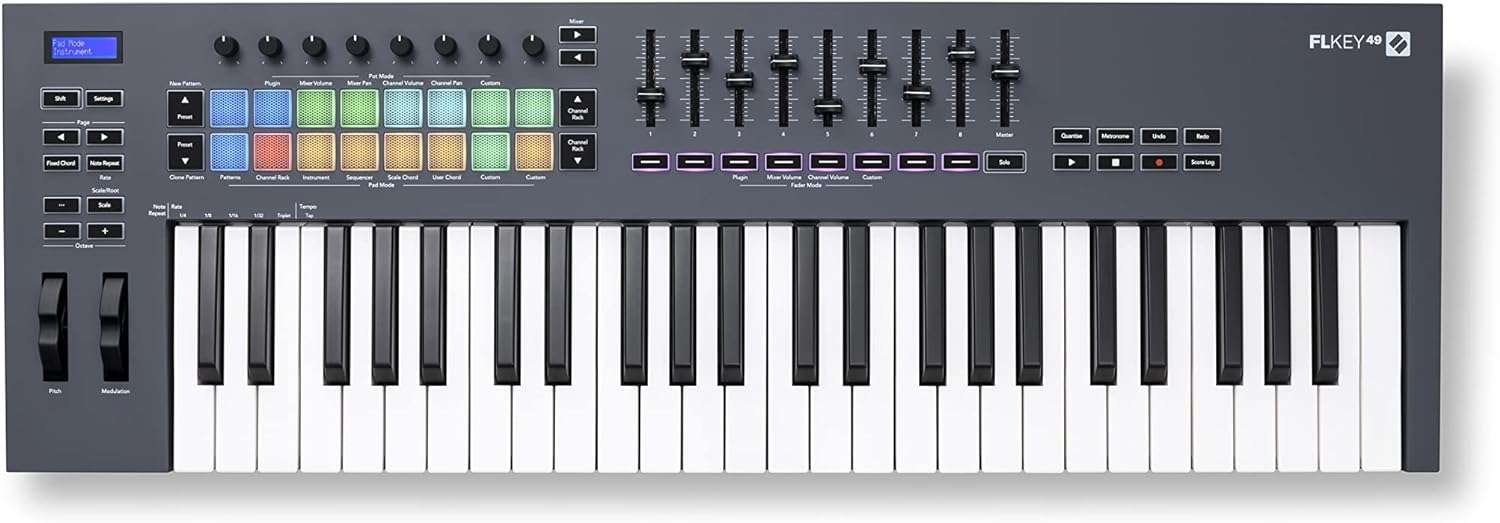
The Novation FLKEY 49 is an excellent MIDI keyboard for beginners, especially those using FL Studio.
With 49 full-size velocity-sensitive keys, it offers a responsive and dynamic playing experience. This keyboard integrates seamlessly with FL Studio, providing intuitive controls for your music production. The FLKEY 49 features 16 velocity-sensitive pads, ideal for creating beats and triggering samples.
Additionally, it includes eight assignable knobs for precise control over your sound. The easy USB connectivity ensures a hassle-free setup and the user-friendly design makes it accessible for beginners.
Despite its larger size, the FLKEY 49 is lightweight and portable, suitable for both studio and mobile use. For those starting their music journey with FL Studio, the Novation FLKEY 49 is a top choice.
Pros:
- 49 full-size velocity-sensitive keys
- Seamless integration with FL Studio
- 16 velocity-sensitive pads
- Eight assignable knobs
- Easy USB connectivity
- User-friendly design
- Lightweight and portable
Cons:
- Larger size compared to compact models
- Primarily designed for FL Studio users
- Pads and knobs may be overwhelming for absolute beginners
M-AUDIO Keystation Mini 32 MKIII: Compact and Efficient
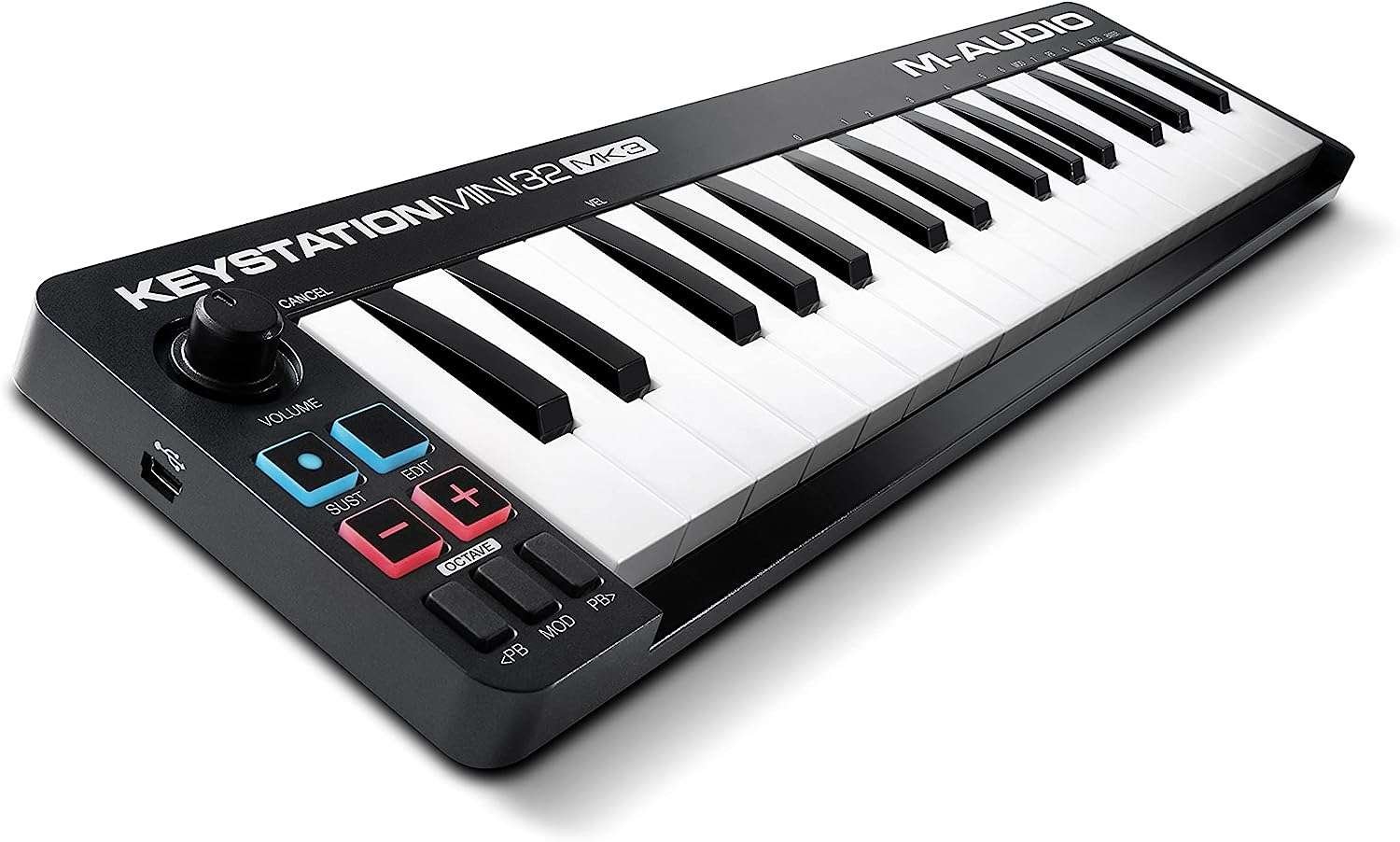
The M-AUDIO Keystation Mini 32 MKIII is perfect for beginners seeking a compact and efficient MIDI keyboard.
With 32 mini velocity-sensitive keys, it offers a responsive playing experience in a portable design. This keyboard connects easily via USB, ensuring a quick and straightforward setup.
Despite its small size, the Keystation Mini 32 MKIII includes essential features like pitch bend, modulation controls, and octave shift buttons, enhancing your music creation process. It is compatible with most DAWs, giving beginners flexibility in their music production.
Its compact and lightweight design makes it ideal for musicians on the go, fitting easily into backpacks and small studio spaces. For an affordable and travel-friendly option, the M-AUDIO Keystation Mini 32 MKIII is an excellent choice.
Pros:
- Compact and lightweight design
- 32 mini velocity-sensitive keys
- Easy USB connectivity
- Includes pitch bend, modulation controls, and octave shift buttons
- Compatible with most DAWs
- Affordable price
Cons:
- Limited to 32 mini keys
- Basic features compared to larger models
- No drum pads or assignable knobs
What to Look for in a Beginner MIDI Keyboard?
When choosing a beginner MIDI keyboard, consider several key factors.
Look for a keyboard with a user-friendly interface, making it easier to learn and use. Portability is important if you plan to make music on the go, so consider the size and weight. The number of keys matters; 25 keys are great for portability, while 49 keys offer a more extensive range for playing.
Check for velocity-sensitive keys, which respond to the intensity of your playing, adding expressiveness to your music.
Compatibility with popular DAWs (Digital Audio Workstations) is crucial, ensuring that your keyboard integrates smoothly with your music production software. Additional features like drum pads, knobs, and faders can enhance your creative possibilities but aren’t essential for beginners.
Finally, consider your budget; many affordable options offer excellent features without breaking the bank.
How to Set Up a MIDI Keyboard?
Setting up a MIDI keyboard is straightforward.
First, connect your keyboard to your computer using the USB cable provided. Most modern MIDI keyboards are plug-and-play, so your computer should recognize the device automatically. Next, install any necessary drivers or software that comes with your keyboard.
Open your DAW and configure the MIDI settings to recognize your keyboard. In the DAW settings, select your MIDI keyboard as the input device. Ensure that your keyboard is set to the same MIDI channel as your DAW.
Test the setup by playing some keys to check if the DAW receives the input. If you encounter issues, refer to the user manual or the manufacturer’s website for troubleshooting tips.
With these steps, you’ll be ready to start creating music.
Common Beginner Mistakes and How to Avoid Them
Beginners often make a few common mistakes when using MIDI keyboards.
One mistake is not reading the user manual, which can provide valuable information about your keyboard’s features and setup. Another is neglecting to configure the MIDI settings in your DAW properly, leading to frustration when the keyboard doesn’t work as expected.
Always take time to familiarize yourself with both the keyboard and the software. Overlooking the importance of velocity sensitivity is another mistake; practising dynamic playing can significantly improve your music. Beginners may also ignore the potential of additional controls like drum pads and knobs, which can add versatility to your music production.
Finally, avoid getting overwhelmed by complex features; start with the basics and gradually explore more advanced functionalities.
Recommended Software for Use with MIDI Keyboards
Several DAWs are highly recommended for use with MIDI keyboards:
- Ableton Live
- Why Choose It? Intuitive interface and powerful features
- Who Is It For? Suitable for beginners and professionals alike
- FL Studio
- Why Choose It? User-friendly design and comprehensive toolset
- Who Is It For? Great for all levels, from beginners to advanced users
- Logic Pro X
- Why Choose It? Wide range of instruments and effects
- Who Is It For? Ideal for Mac users seeking a professional DAW
- GarageBand
- Why Choose It? Free and entry-level
- Who Is It For? Perfect for beginners using Mac
- Reaper
- Why Choose It? Cost-effective with a wide array of features
- Who Is It For? Suitable for those on a budget
- Pro Tools
- Why Choose It? Professional-grade with advanced recording and editing capabilities
- Who Is It For? Ideal for serious musicians and professionals
These software options provide excellent platforms for beginners to start their music production journey with a MIDI keyboard.
Conclusion: Best MIDI Keyboards for Beginners
In summary, the best MIDI keyboards for beginners offer a balance of functionality and ease of use.
For portability and simplicity, the AKAI Professional LPK25 MK2 and KORG NANOKEY2 are excellent choices. If you need more features and integration, the Novation Launchkey Mini [MK3] and AKAI Professional MPK Mini MK3 stand out with their pads and knobs. For a full-size option, consider the M-AUDIO Keystation 49 MKIII or ALESIS V49 MKII, which provide a realistic playing experience. FL Studio users will benefit from the Novation FLKEY 49, while those needing a compact option should look at the M-AUDIO Keystation Mini 32 MKIII.
Choose based on your specific needs, whether it’s portability, feature set, or software compatibility. Each of these MIDI keyboards will support and enhance your music production journey effectively.
10 MIDI Keyboard FAQs for Beginners
1. What is a MIDI Keyboard?
A MIDI keyboard is an electronic device that allows musicians to generate and control sounds from computer software or external hardware synthesizers.
2. How do MIDI Keyboards connect to computers?
Depending on the model and setup requirements, they usually connect via USB, MIDI cables, or Bluetooth.
3. Can I use MIDI Keyboards without a computer?
Some MIDI keyboards work standalone with external hardware like synthesizers, but many require a computer or mobile device to generate sounds.
4. What features should I look for in MIDI Keyboards?
Look for key count and action, pad and control quality, connectivity options, software compatibility, and power requirements based on your needs.
5. Do MIDI Keyboards produce sound on their own?
No, they control and trigger sounds in software or external hardware but don’t generate sound independently.
6. Are MIDI Keyboards compatible with all music software?
Most are universally compatible with major digital audio workstations (DAWs) through standard MIDI protocol, but some offer better integration with specific software.
7. What is the difference between weighted and unweighted keys?
Weighted keys mimic the feel of an acoustic piano, offering more resistance, while unweighted keys are lighter and faster, ideal for synth playing.
8. How important is the number of keys on MIDI Keyboards?
It depends on your playing style and space. More keys allow for a wider range of notes, while fewer keys save space and are portable.
9. Can beginners use MIDI Keyboards?
Absolutely. MIDI Keyboards are accessible to all levels, with many models designed specifically for beginners.
10. How do I choose the right MIDI Keyboard?
Consider your music production needs like:
- workspace size
- budget
- desired features to find a model that suits your creative workflow
Additional Resources
Producing Techno? Get Your Free Sample Packs.
Dive into electronic music production with our newly released “Free Techno Tools V1” and “Free Techno Tools V2” sample packs. These packs are full of high-quality sounds that will add a professional touch to your tracks. If you’re looking to expand your sound library, these free sample packs are perfect for every techno fanatic. Click on the links below to access these fantastic resources and elevate your production game today!
Connect With Us.
Join our vibrant community for more wisdom and updates:
And Always Remember…
Have Fun & Be Creative!

